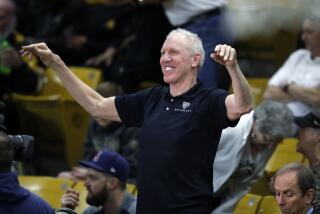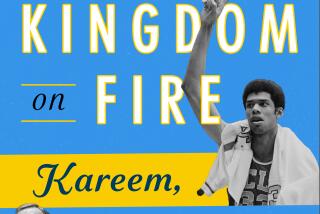Getting It Done : 7-Foot-4 Eaton Grows Into His Own in NBA
- Share via
Go ahead, laugh at Mark Eaton. Scoff at his limited athletic abilities and marginal offensive skills. Recall those funny one-liners--how Eaton has trouble jumping over the Sunday paper and the shooting touch of a polar bear.
Give him your Stiff-of-the-Day award, as a sports radio talk-show host did last Friday after Eaton went scoreless against the Clippers the night before.
But before you pass this 7-foot-4, 290-pound giant off as the NBA’s biggest non-factor, consider this:
Eaton is in his 11th season as starting center for the Utah Jazz, a perennial league power that has made the playoffs nine consecutive years and currently shares the Midwest Division lead with San Antonio.
Eaton was named NBA defensive player of the year in 1985 and ‘89, made the league’s all-defensive first team in 1985, ’86 and ’89 and second team in ’87 and ‘88, and led the league in blocked shots average four times.
Not bad for a guy who spent most of his senior season at Westminster High School on the bench, played only 41 minutes as a senior at UCLA and was considered a longshot to even make the pros.
Eaton, 36, also owns two houses, one in the scenic mountains of Park City, Utah, and another in Laguna Niguel, and has made enough money and wise investments so that when he retires he won’t have to work another day in his life.
Pretty good for a guy who was doing tuneups and brake jobs and fixing flat tires for a living 15 years ago.
Stopped laughing, have you?
Eaton knows he won’t go down as one of the NBA’s all-time greats--centers with career scoring averages of 6.2 aren’t put in the same class as Wilt Chamberlain, Bill Russell and Kareem Abdul-Jabbar. And Eaton can’t even approach the star status that teammates Karl Malone and John Stockton have achieved in Salt Lake City.
But Eaton has been a factor in the NBA and has made a good living in the league, primarily because he’s fully aware of all his shortcomings, if a 7-4 guy can have such things.
“I’m obviously not the world’s greatest player, and people still say I can’t do this and can’t do that, but I do certain things well,” said Eaton, who is in town for Utah’s game against the Lakers tonight.
“I’ve always tried to learn more about the game and become more proficient and effective in the things I do. It’s amazing, if you’re willing to expend the extra effort, how much farther you can go than someone who has a lot of talent and isn’t willing to put in the work.”
Hard work, defense and blocked shots have always been the core of Eaton’s game. Earlier this season, Eaton became only the second NBA player to exceed 3,000 blocked shots--Abdul-Jabbar is the other, but it should be noted that blocked-shot statistics weren’t kept when Chamberlain and Russell played.
Eaton has a career rebounding average of 8.2. He sets one of the sturdiest picks in the NBA, he’s a solid outlet passer who is adept at length-of-the-court passes, and his mere presence often forces opponents to alter their offensive strategy.
“People have always been on my case because I don’t score enough, but fans, for the most part, really only look at one end of the floor,” Eaton said. “They don’t understand the nuances and intricacies of basketball that are a big part of my game and don’t show up in the stat sheets or to the average fan.”
They’re beginning to understand, though. Eaton missed only nine games in 10 previous seasons, but he sat out the first nine this season while recovering from knee surgery.
Though he’s still slowed by the injury, and his playing time is down considerably--he’s averaging 14 minutes--Eaton said he has noticed an increase in fan approval since his return.
“I’ve always been there and always played, and I think a lot of people didn’t realize what I did out there until I was gone,” Eaton said. “But since I’ve come back, the comments people make to me, the things that are said on talk shows, are more positive.”
Utah Coach Jerry Sloan, a guard for the Chicago Bulls in the 1970s, said the same thing happened to his former teammate, much-maligned center Tom Boerwinkle.
“People didn’t realize how good he was until he wasn’t there anymore,” Sloan said. “You talk to coaches around the league, people you have respect for, and they say Mark has made a difference.
“The negative letters I got in the past were often about Mark. They’d say, ‘Why do you play him? He can’t shoot.’ But look at what he’s done for our team and franchise. He’s been here 11 years.”
Sloan has also noticed what Eaton has done for other teams--namely, force them to change strategies to counter his size. Last season, teams increasingly began to use smaller lineups against the Jazz, forcing Eaton to match up with a quicker player who would take Eaton outside and attempt to drive past him.
Sloan had to counter those moves with adjustments of his own, and that resulted in Eaton’s average playing time falling from 32 minutes in 1990-91 to 25 in 1991-92. But Eaton’s absence always seemed to leave a void in the middle.
“It’s very simple--when Mark’s in the game, teams don’t drive to the basket as freely,” Sloan said. “And as soon as he goes out, teams try to beat us inside. But if other teams keep going smaller, it cuts back on his minutes.”
And blocked shot opportunities. Eaton’s blocked shots have decreased gradually since his NBA-record 456 in 1984-85--he has hovered around the 200 mark in each of the last three seasons--but decreased playing time hasn’t been the only culprit.
“I look back at the year I averaged 5.5 blocks a game and wonder, ‘How did I do that?’ ” Eaton said. “I look at tapes now and don’t see the same amount of opportunities I had then.
“Most players know what I can do, figure it out, change and adapt. Really, rookies and young players are the only ones who have a tendency to try to come down the middle on me.”
That’s an area Eaton has always considered his own, and this philosophy has helped him become one of the league’s premier shot-blockers--not the type to swat balls into the fifth row, but a player who has learned to tap a blocked shot to a teammate to start a fast break.
“I view the key as my area, and anyone who comes in there, be it a guard or center, I’m responsible for,” Eaton said. “The key to blocking shots is position, a willingness to leave your man and not jumping and going after head fakes. Of course, once you learn to hold your position and not go for fakes, they say you can’t jump anymore.”
No, the words “vertical leap” and “hang time” don’t often come up around Eaton, but “incredible success story” does.
As an awkward teen-ager struggling to gain command of his rapidly growing body, Eaton thought so little of his basketball skills after high school that he enrolled in a one-year auto mechanics program at an Arizona trade school.
He returned to Orange County and was working in a Mark C. Bloome tire and repair center when Cypress College assistant Tom Lubin drove by and noticed Eaton towering over a customer. Lubin pulled in, fabricated some story about having car trouble and asked Eaton if he’d consider playing ball at Cypress.
Eaton enrolled in 1978--this was three years after he graduated from high school--and, under the direction of Coach Don Johnson, helped the Chargers win the 1980 State community college championship.
Eaton accepted a scholarship to UCLA but spent most of the time on the Bruin bench, his ultimate indignity coming when Larry Farmer, then the coach, left him behind on the last trip of the 1981-82 season.
Still, 7-footers being a rare commodity, Utah took a chance and picked Eaton on the fourth round in 1982. They made a commitment, signing Eaton to a five-year contract, and he made a commitment to the Jazz, displaying a daily work ethic that helped him reduce his percentage of body fat from 18.6% when he entered the league to 9.8% this season.
Eaton became a starter midway through his rookie season and has been an integral part of the Jazz’s rise from NBA doormat to annual contender.
Asked what might have happened had Lubin not driven by the tire store that day, Eaton said, “I’d probably still be in the auto industry somewhere. Hopefully I would have been a service manager by now.”
Eaton has managed his services quite well in the NBA, staying in good shape, working hard in the off-seasons, sticking to his strengths on the court and not trying to do things he knows he can’t do.
He has managed his finances well, too, and will be able to support his family, which includes his wife, Marcie, and sons, Nick, 5, and Doug, 3, after his playing career is over.
He hasn’t risen to NBA superstar status, and he’s not even a favorite of the hometown fans, but that doesn’t bother Eaton.
“It wasn’t my expectation to come in and be a big, marquee player with all the adulation that goes with it,” Eaton said. “I just wanted to come in and do my job, be effective, be appreciated by the immediate people around me and then go home after the game. That’s all.”
More to Read
Go beyond the scoreboard
Get the latest on L.A.'s teams in the daily Sports Report newsletter.
You may occasionally receive promotional content from the Los Angeles Times.











